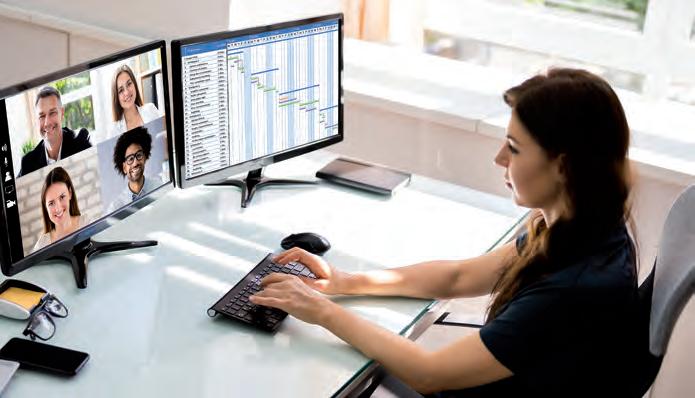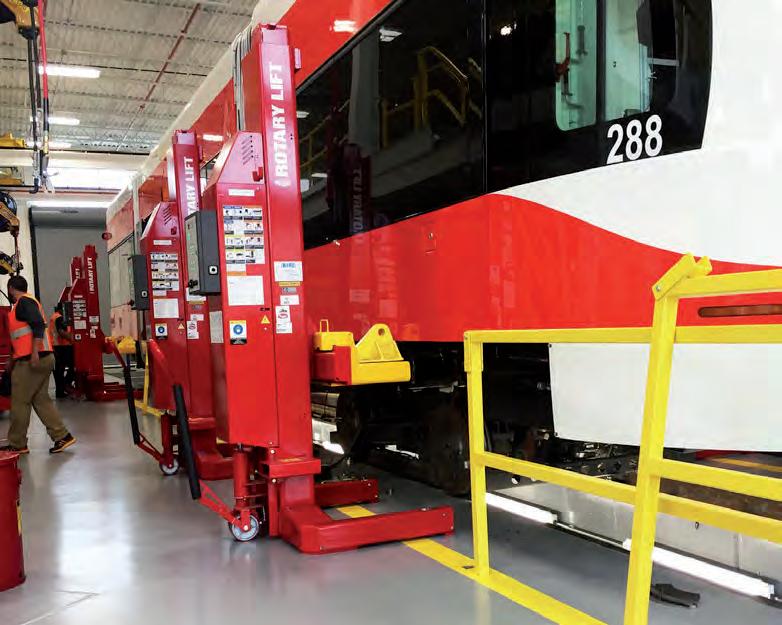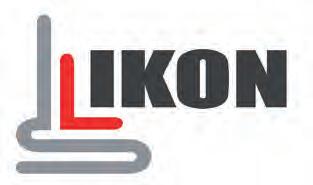
8 minute read
Thales makes positive progress in pandemic
by Prime Group
The Workforce
Positive progress in the pandemic
Thales Director of Technical and Engineering, Michael Powell, speaks to Rail Express about how the company is ensuring its staff remains productive and positive while coping with the challenges posed by lockdowns.
Not just a global leader in the aerospace, defence, transportation, communications, digital identity and security markets, giant multinational company Thales is also firmly showing the way forward in managing the workplace disruption caused by COVID.
It has taken a proactive human resources stance in confronting the challenges of the “new normal”, placing emphasis on the welfare of its employees as they come to grips with adapting to the pandemic.
“Our CEO once said this new situation is like a forced experiment,” Powell said.
“Today, everyone has been forced to learn to work remotely, to move to a different mode of working.
“And essentially, with this kind of disruption, what we’re doing is learning new skills. There are people in the workplace for which working remotely is entirely new for them and we need to recognise this new element of our workplace because it is here to stay in some form.”
MANAGING THE WORKFORCE
Powell said there was no escaping the fact that there is now just “a different way of working”.
“It’s all the way along the chain, from when you’re remote from your colleagues, from your customers, from your suppliers or whomever you’re dealing with,” he said.
“And this has been an adjustment for people. And I think it’s important that companies recognise that everyone is different in this kind of journey, if you like.”
Powell said that from the outset of the virus outbreak, Thales ensured that all staff members could work remotely from home in Australia, or at least were fairly well-placed for this.
“This resulted in a type of flexible, hybrid habit where some people worked from either home or office or both as the situation changed,” he said.
Thales is helping staff adapt to working from home or remote locations.
The arrangement of course was not ideal for everyone, which Thales was quick to take into account.
“Like every company, we have people at different stages of their lives and different personal requirements,” Powell said.
“Some people have young children who may need to be homeschooled, or maybe they don’t have kids but might be living alone.
“In a lockdown situation, they’re missing interaction with colleagues like they used to, and I think it’s important for organisations to understand those differences.”
Thales has put in place several initiatives to lift the morale of its workforce.
“For example, the company has introduced a program which provides some online activities for kids, which is funded by the company,” Powell said.
“Kids can interact with a teacher and do some activities, giving the employees or parents a couple of hours break during the day.”
Even more important is checking in on the mental health of staff.
“We interact frequently with our teams,” Powell said. “We have regular check-ins with our staff members. These interactions have naturally changed during the pandemic from action lists, tasks, schedules, and so on to more of “how are you going”, “do you have everything you need” and importantly, “how can we help”.
“We have an employee assistance program, which allows people to reach out to a professional in case they’re struggling. It’s an anonymous program, so the company doesn’t know who utilises it, but it’s free for everybody.
“It really embraces the RUOK philosophy, to understand that people respond to this in a different way. We’ve had a strong safety focus for a number of years, but after the events of the past 12 months, it’s really vital to include mental health into the safety culture.
“Mental health is definitely a safety issue, and it should be addressed and managed and treated as such.
“We have provided training to managers, because they’re not doctors, they’re not psychologists. So this actually raises the issue of mental health to a to a higher plane.”
The safety measures also take a more physical form at the workplace sites.
“Even with COVID lockdowns and quarantines, we have people attending to sites, for example tending to metro stations to do installation and other works,” Powell said.
“Managing the safety hazards associated with this sort of environment has become very complex. Initial safety assessments did not include, for example, the wearing of face masks and glasses which can fog up.
“We have people that need to come into the office for various reasons. For a period of time, we set up rapid antigen testing at our facility, to test people before they came onto site to mitigate the risk associated with this whole situation.
“If staff are coming into work, we want to make sure that we’re not then impacting others on site and creating a safety issue for them. It’s created a complex situation for the company because, for example in Sydney, they’re starting to lock down particular local government authorities, so certain people might be able to travel to work one day, but not the next day.
“There was a lot of discussions about for
example, how many people we put in meeting rooms, making sure we have the right amount of disinfectant and sanitiser, making sure people are wearing masks.
“Thermal cameras were installed at the entry and exit points of our building to measure the temperatures of staff coming to the office.
“It’s highlighted simple things in our HR system to understand where people live so we can notify the right people and understand where our people are coming from.
“Simple things like making sure that people keep the phone numbers up to date, and other things that brings on a new importance, that we’ve not had to deal with previously.”
Thales was also constantly looking to new ways to attract and retain key staff.
“This ranges from clearly remuneration, but also the need for flexibility and also development opportunities,” Powell said.
“A recent internal survey revealed that by far the most needed investment is in development opportunities, not just in training but also in diversity of role.
“No longer are our people content to have the same position for a long time, they are looking for new challenges and diversity of opportunity. Many people don’t want to be rewarded for good performance by staying in the same role.
“If an organisation will not provide opportunities they will simply find it elsewhere. Sometimes this diversity of opportunity can be at the detriment of particular project, but losing people is by far the bigger loss.
“So this flexibility and attention to the development of our people is critical for our future.”
THE SUPPLY CHAIN
Powell said that during COVID, the situation of customers was also changing, with some projects delayed and some accelerated depending on their project stage.
“This means the need for a more flexible and adaptable workforce,” he said. “The demand for high performers is extremely high and these high performers are needing different skills than before.”
As a contractor aligned with many small to medium enterprises, Thales has also taken on a corporate responsibility to keep the economy flowing.
“There’s been a big push to involve more businesses in our work, to ensure that we’re giving them contracts to keep them engaged,” Powell said.
“In fact, during the pandemic, Thales Australia reduced our payment terms to support small to medium enterprises, to help them stay in business.
“I think it’s incumbent on companies which have the capacity to do so, like Thales, to be able to do that. I am sure this was well received by our suppliers.”
ON THE UPSIDE
Thales even sees a silver lining in the COVID clouds as it makes the most of the situation.
Powell said the circumstances could be viewed as an accelerator for digital transformation.
“For example, in a pre-COVID time, it would have been hard for companies to progress into digital technologies and processes because different customers and different suppliers would be working in different stages,” he said.
“But with the necessity to work remotely, the transition into the digital world would be speeded up. “Sorry, I was on mute” has become a very common remark in the workplace, and the importance of technologies from headsets to speakers to collaboration tools has taken on a new and different importance.”
And that would be a big leap forward for efficiencies within the rail sector, as well as a benefit for Thales itself.
“It can be autonomy, big data, artificial intelligence, cybersecurity – by championing digital technologies and combining them with our rail applications expertise, Thales is a natural partner to accompany its transport customers in their digital transformation,” Powell said.
MCHW20 Mobile Column Lift
IKON Equipment Pty Ltd Email: sales@ikonequipment.com.au

LIGHT RAIL LIFT
WIRELESS COMMUNICATION
Operate lift from any column using the exclusive, intuitive control panel found on each column. The MACH FLEX model powered with Red Fire, uses a remote allowing user to move around the bay to more closely observe the lift operation.
• 3 Configurations: 4, 6 or 8 columns - lift up to 160,000 lbs. • Accepts a variety of adapters • AC or DC power options • Designs registered in Australia in compliance with Aust. Standards.
Large, solid base lifting pad for maximum stability under load.
Universal carriage for custom pick-up adapters for use in special conditions such as lifting of rolling stock or light rail.
WIRELESS BATTERY OPERATED LIGHT RAIL LIFT
20,000 lbs. COLUMN CAPACITY

Since 2011 IKON LIFTING EQUIPMENT has become well known for its innovative approaches to wagon lifting and recently to locomotives with mobile battery powered wireless column lifts. Success in all states has been related to coal, grain or ore wagons and IKON is now focussing on passenger rail applications.










